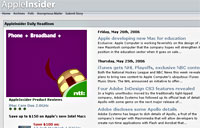 Apple’s attempt to identify the sources of leaked product information that appeared on Mac enthusiast websites has fallen flat on its face after a Californian court ruled that on-line reporters and bloggers are entitled to the same protections as traditional journalists.
Apple’s attempt to identify the sources of leaked product information that appeared on Mac enthusiast websites has fallen flat on its face after a Californian court ruled that on-line reporters and bloggers are entitled to the same protections as traditional journalists.
Apple filed the lawsuit in December 2004 in Santa Clara County after ‘trade secrets’ related to GarageBand, their recording and editing music software, were passed on to bloggers at PowerPage.org, AppleInsider.com, and MacNN.com.
Looking to strip the bloggers of the protection afforded to journalists under California’s shield law, Apple claimed that by reposting “verbatim copies” of Apple’s internal information while exercising “no editorial oversight at all,” the bloggers were not ‘legitimate’ journalists.
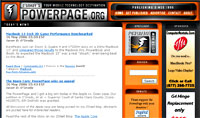 The court was having none of it, with a unanimous ruling giving the three online publications protection under the shield law, as well as the constitutional privilege against disclosure of confidential sources.
The court was having none of it, with a unanimous ruling giving the three online publications protection under the shield law, as well as the constitutional privilege against disclosure of confidential sources.
Writing in a 69-page ruling, Justice Conrad Rushing of the 6th District Court of Appeal underlined the legitimacy of bloggers as bona-fide news-gatherers: “In no relevant respect do they appear to differ from a reporter or editor for a traditional business-oriented periodical who solicits or otherwise comes into possession of confidential internal information about a company”
“We decline the implicit invitation to embroil ourselves in questions of what constitutes ‘legitimate journalism,” he continued.
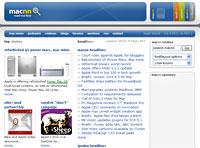 “The shield law is intended to protect the gathering and dissemination of news, and that is what petitioners did here,” added Justice Rushing.
“The shield law is intended to protect the gathering and dissemination of news, and that is what petitioners did here,” added Justice Rushing.
The Electronic Frontier Foundation, who filed the petition on behalf of the journalists, declared the decision a “victory for the rights of journalists, whether online or offline, and for the public at large.”
“The court has upheld the strong protections for the free flow of information to the press, and from the press to the public,” said EFF attorney Kurt Opsahl in a statement.
 All of those children who have been struggling to get their parents to buy them the playground-must-have, an iPod, now have the ultimate excuse – “But it’s for my edukashon!”
All of those children who have been struggling to get their parents to buy them the playground-must-have, an iPod, now have the ultimate excuse – “But it’s for my edukashon!” Deja Vu
Deja Vu Students will be able to download study guides that work with Pearson’s educational texts and listen to review notes to prepare for exams.
Students will be able to download study guides that work with Pearson’s educational texts and listen to review notes to prepare for exams. Apple has used this approach previously. Many years ago Apple started selling their computers to school children at a discount, with the logic that if they were hooked early, they’d be in the Apple-way for the rest of their lives.
Apple has used this approach previously. Many years ago Apple started selling their computers to school children at a discount, with the logic that if they were hooked early, they’d be in the Apple-way for the rest of their lives. As is now part of computer-lore, Apple Computers were called so because of the founders loves of the Beatles and their record label, Apple Corps.
As is now part of computer-lore, Apple Computers were called so because of the founders loves of the Beatles and their record label, Apple Corps. Latterly Apple Corps, with some justification, felt that Apple Computers had now entered the music business, through their iPod players and iTunes music store, so they brought legal action again.
Latterly Apple Corps, with some justification, felt that Apple Computers had now entered the music business, through their iPod players and iTunes music store, so they brought legal action again.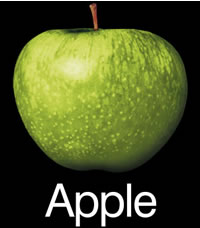 What drove the legal action?
What drove the legal action? A quick catchup. We’ve been covering the
A quick catchup. We’ve been covering the  In 1998 A Bug’s Life came along also bringing $362m in worldwide ticket sales, 1999 saw Toy Story 2 ($485m). The following years saw Monsters Inc, Finding Nemo, The Incredibles all do very well, sealing Pixar as _the_ CG animation stuido.
In 1998 A Bug’s Life came along also bringing $362m in worldwide ticket sales, 1999 saw Toy Story 2 ($485m). The following years saw Monsters Inc, Finding Nemo, The Incredibles all do very well, sealing Pixar as _the_ CG animation stuido. Channel 4 is offering a UK online exclusive of the entire first series of the cult hit show, Lost.
Channel 4 is offering a UK online exclusive of the entire first series of the cult hit show, Lost. You’ll have to be quick to watch the new series online though, as episodes one and two will only be free to view for two weeks (until May 11th 2006.)
You’ll have to be quick to watch the new series online though, as episodes one and two will only be free to view for two weeks (until May 11th 2006.)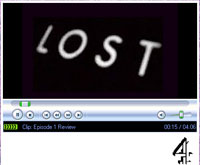 Obsessive fans hoping to work out the dark complexities of the series by analysing each show in infinite detail will be disappointed to learn that it’s only possible to watch episodes for a 24 hour period on a single PC before the pesky thing goes into auto-destruct,
Obsessive fans hoping to work out the dark complexities of the series by analysing each show in infinite detail will be disappointed to learn that it’s only possible to watch episodes for a 24 hour period on a single PC before the pesky thing goes into auto-destruct, Lost video is only available to UK users using Windows Media Player 10 or above.
Lost video is only available to UK users using Windows Media Player 10 or above.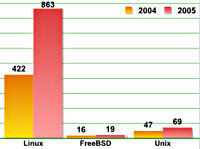 Attacks against non-Windows operating systems – particularly Linux – are growing quickly, according to a Kaspersky Lab report.
Attacks against non-Windows operating systems – particularly Linux – are growing quickly, according to a Kaspersky Lab report. Those Mac bugs
Those Mac bugs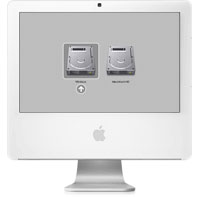 After hackers successfully managed to get an Intel-powered
After hackers successfully managed to get an Intel-powered 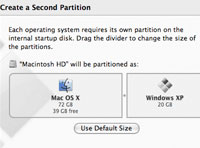 Once the installation process has done its thing and the Mac booted into Windows, users must then slam in their Drivers CD and sit back while it does it thing.
Once the installation process has done its thing and the Mac booted into Windows, users must then slam in their Drivers CD and sit back while it does it thing. Two new studies into branding have produced two very different results, with a UK study declaring Microsoft the strongest brand in the known universe, while research in the US saw consumers slapping Microsoft down to near-bottom of their ‘most trusted’ list.
Two new studies into branding have produced two very different results, with a UK study declaring Microsoft the strongest brand in the known universe, while research in the US saw consumers slapping Microsoft down to near-bottom of their ‘most trusted’ list.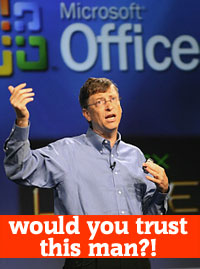 Bose, Dell, and Apple Score High On Trust
Bose, Dell, and Apple Score High On Trust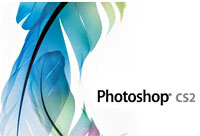 Frappuccino-supping designers desperate to run Adobe’s high-end Photoshop graphics suite on their shiny new Intel-powered Mac computers are going to be in for a long wait, according to Adobe engineer Scott Byer.
Frappuccino-supping designers desperate to run Adobe’s high-end Photoshop graphics suite on their shiny new Intel-powered Mac computers are going to be in for a long wait, according to Adobe engineer Scott Byer.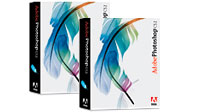 Apple’s switch from PowerPC to Intel chips has forced software vendors to rewrite their code to accommodate the different architecture as the chips don’t share the same ‘language.’
Apple’s switch from PowerPC to Intel chips has forced software vendors to rewrite their code to accommodate the different architecture as the chips don’t share the same ‘language.’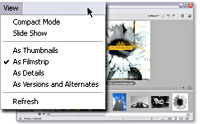 Currently, only Apple’s iMac, MacBook Pro and Mac Mini machines are powered by Intel chips, with the iBook and PowerMac machines still using IBM PowerPC chips.
Currently, only Apple’s iMac, MacBook Pro and Mac Mini machines are powered by Intel chips, with the iBook and PowerMac machines still using IBM PowerPC chips. Back in our day, the only round thing that kids had in their pockets were marbles, conkers and gobstoppers, but German MP3 player maker Maxfield wants kids to shell out for their Max-Joy digital music player.
Back in our day, the only round thing that kids had in their pockets were marbles, conkers and gobstoppers, but German MP3 player maker Maxfield wants kids to shell out for their Max-Joy digital music player.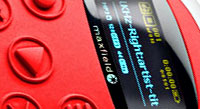 There’s 256MB of on-board storage, with the option to add more song space via a SD memory card slot.
There’s 256MB of on-board storage, with the option to add more song space via a SD memory card slot. The Max-Joy runs off a single AAA battery, which the makers claim will give up to 19 hours’ playback time, offering plenty of potential for parents to get a bit of peace.
The Max-Joy runs off a single AAA battery, which the makers claim will give up to 19 hours’ playback time, offering plenty of potential for parents to get a bit of peace.